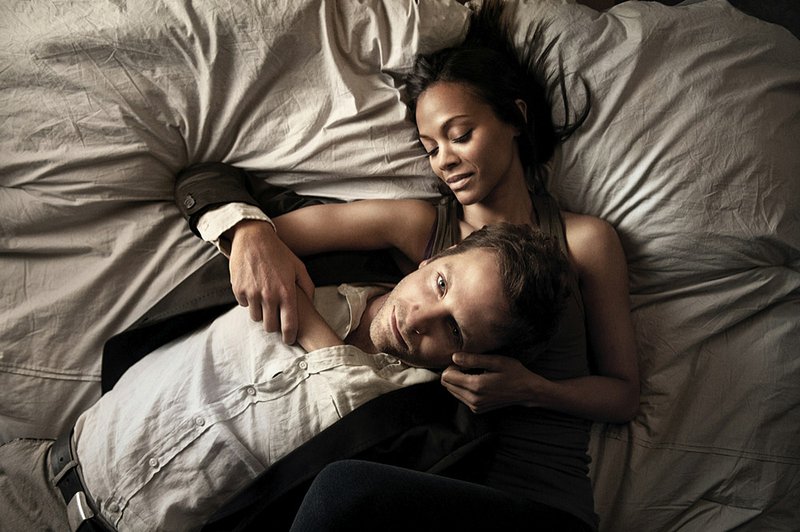LITTLE ROCK — You want to get meta for a moment? Here we have a fictional movie made about a fictional novel by a fictional author about a struggling fiction writer who, in artistic desperation, steals an old novel written by another, much older fictional author who was writing from the bitter experience of his life, and then is forced to confront the fictional book’s fictional original writer. As told to us by the fictional author who begins the film.
Got all that? Brian Klugman and Lee Sternthal’s film wants to be taken as a kind of literary Inception, with layer upon layer of erudite subterfuge, but the problem is that the layers of this particular onion are so rice-paper thin, you can see straight through them.
The starting off point involves Clay Hammond (Dennis Quaid), a successful novelist who has just published a well-received novel(titled - yep - The Words) and is performing a public reading in a packed auditorium. As he reads selections from the book, we see the narrative of the novel, set in contemporary times, laid out before us. Rory Jansen (Bradley Cooper) is an aspiring novelist, living with his stunningly beautiful wife (Zoe Saldana), in a Brooklyn studio apartment.
He attempts to get his work published the old-fashioned way, but when he meets a steady stream of resistance, he begins to despair. Then he discovers an old manuscript hidden in a battered leather briefcase he and his wife bought on their Paris honeymoon, written, we are to understand, sometime in post-war France. One thing leads to another, and Jansen is suddenly submitting this work as his own, and in so doing, sets the - ahem - literary world aflame, winning awards and receiving huge acclaim.
However, to Jansen’s horror, the author of the manuscript, known only as the “Old Man” (Jeremy Irons) recognizes the work from his youth, and confronts the young author. From there, we learn the Old Man’s story of love and loss, with his beautiful French wife (Nora Arnezeder) eventually leaving him after the death of their infant daughter, which is what led him to write the manuscript.
Meanwhile, back in our first level of fictional reality, Hammond is approached by a young, beautiful graduate student (Olivia Wilde) during a break in the reading, and they make googly eyes at each other while he is taking her home to his stunning Manhattan apartment.
So, essentially, we have three levels of storytelling going on more or less concurrently, which should be invigorating, if not a wee bit confusing. But the “prose” that sparks all these goings on reads like entries from the annual Bad Hemingway contest, all dull minimalism and pronouns (the “Old Man” affectation is only the beginning). As but one example, the novel for which Jansen receives all this acclaim is howlingly titled The Window Tears, which sounds less like a literary bombshell and more like a Nancy Drew mystery. Fire up the convertible, Ned.
Worse, rather than explore the ways in which stories come to us, a far more interesting view of fiction writing, the film is resolute in its melodrama, assuming that the wispy characters and their struggles with beautiful women are enough to rivet us to the screen.
Certainly the high-powered cast seems to believe so,playing their two-dimensional roles with a vigor the writing simply cannot support. At one point, Jansen describes his literary style as “angry young man” but there’s nothing in his life to be the least bit perturbed over - unless he’s enraged that his lovely, adoring wife who allows him all the time in the world to write is forever leaving her sheer stocking on the shower door. The Old Man, for all his condemnation of Jansen for appropriating his work, has himself merely ripped off A Farewell to Arms, an allusion from which the film doesn’t even consider distancing itself: Hemingway novels figure prominently on everyone’s bookshelves.
But bad Hemingway does not a literary motif make. If you plan on having a film extolling the virtues of the written word, your protagonists better be able to carve out a coherent sentence or two in the process, or else your entire premise withers to dust.
As if to hide its inherent genetic weakness, the film ends on a peculiarly opaque note, leaving us to infer that Hammond based his novel on some sort of similar circumstance as his narrator. I suppose, if one so desired, you could dig deeper into the layers the film presents to try and uncover the truth, but I suspect all you’d eventually discover would be a few ragged-eared copies of Hemingway-based Cliffs Notes.
The Words 68 Cast: Bradley Cooper, Zoe Saldana, Dennis Quaid, Jeremy Irons, Olivia Wilde Directors: Brian Klugman, Lee Sternthal Rating: PG-13, for brief strong language and smoking Running time: 96 minutes
MovieStyle, Pages 33 on 09/07/2012
